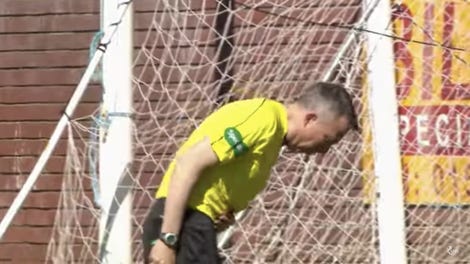
If you’ve ever seen a youth official get jeered by a crowd after a close call and thought, “Why does anyone want to be a ref?” you’re not alone. Across the country, high school athletic associations are getting more desperate as they try to recruit qualified officials for their sporting events.
Low retention rates and aging current referees, coupled with increased games for those refs to work, means the situation could become dire if not reversed soon. As things stand, a drastic shift—either in compensation or in how referees are treated—might be needed if schools don’t want to cut back on team schedules. Reports from several newspapers exploring the issue all hold a few common threads that help explain the shortage.
- The pay sucks. As New York’s The Journal News reports, officials working non-scholastic games can bring in as much as $1,000 over a weekend, and public schools can’t match that, typically offering around $100 per game. Considering the fees and time that go into becoming certified as an official (including $115 just to be fingerprinted), it’s understandable that many people don’t find working multiple weekday nights for a few hundred bucks worth all the effort.
- There are a lot more teams—and therefore a lot more games—than there used to be. Since Title IX, youth participation in sports has nearly doubled from around 4 million to around 8 million. That’s a good thing, but referee participation hasn’t increased to meet the higher demand. The Washington Post notes that this has especially affected a growing sport like soccer:
Player participation numbers rise every year in the D.C. area while referee organizations grapple with stagnation or decline, leaving youth leagues in a constant scramble to fill officiating slot.
3. Refs are getting older, and the new ones aren’t sticking around. The Journal News quotes the president of the Mid-Hudson Valley Baseball Umpires Association as saying they have 10 umpires over the age of 60, and even two in their 80s. In Houston, retention rate for referees is below 50 percent, and in Colorado, 1,400 referees didn’t return for the 2016-17 season. The head of officials for the Colorado High School Activities Association remarked that as fewer educators work shifts as high school refs, it’s difficult to know how to find new ones:
“In my own assessment, a lot of those past officials were educators and they were people who were in the schools on a daily basis, like coaches who would coach one sport and then officiate a different sport the next season,” Robinson said. “But somehow, that’s changed over time, just like the changed standard of a lot of coaches no longer being in the building.
“Officials now are coming from all walks of life, so how do you pinpoint the exact demographic so we can target them? It’s not clear cut.”
4. The most clearly visible reason is that abuse from fans isn’t worth putting up with. The Post article shares anecdotes from a number of referees who have had to deal with parents jeering them to the point they were offered escorts to their cars, a female ref who had to eject players who called her a whore, and the tale of a ref stuck working on a freezing night in Virginia who had just called a controversial penalty kick:
At some point, it dawned on him. He was cold; he was wet; his family was waiting for him at home. Why was he on this frigid turf field, enduring this relentless torrent of callous barbs?
“There’s zero regard for the fact that I’m making a sacrifice to be here,” he thought, “and I’m being sacrificed.”
With low pay, long hours, and certainly no promise of fame or fortune, refereeing a game can be as much about love of the sport as playing itself. Take any kind of pleasantness away from the job, and there’s not much left.






